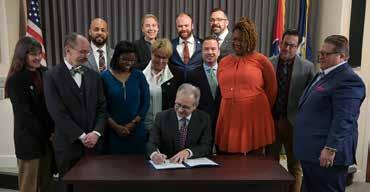
7 minute read
LGBT Representation in Metro Government A Conversation With Mayor David Briley
James Grady
On February 11, 2019, Mayor David Briley signed an historic executive order that initiated the process of collecting data to support adding LGBT-owned businesses to Metro’s diversity procurement program. In the long term, that policy may change the way that LGBT-owned enterprises will do business with Metro government. But, in the short term, it signaled this administration’s commitment to revising its procurement processes to create a fairer environment and to continuing efforts to make Nashville an open and welcoming city for LGBT citizens.
Advertisement
Indeed, since taking office in the after math of Mayor Megan Barry’s resignation and since being elected in his own right shortly thereafter, Mayor Briley has consistently made LGBT issues a matter of concern for his administration. This is reflected not only at the policy level, but also in the personnel choices he has made.
Joseph Woodson and Patrick Ham ilton, well-known members of the Nashville LGBT community, were both carryovers from the Barry administration. Under Briley, however, both have seen

their roles expanded. Hamilton, who was Barry’s scheduling secretary, is Briley’s deputy chief of staff. Woodson is now Briley’s senior legislative advisor; more recently Woodson has also adopted the role of the mayor’s official LGBT commu nity liaison.
Thus, the LGBT community has un precedented representation at the highest levels of this administration. Briley credits these representatives with keeping LGBT issues front and center for his administration.
“I’m probably not supposed to do this,” Briley joked, “and give credit to somebody else. But Megan [Barry] had been working on LGBT issues like the ones we have focused on a long time. I think it just took somebody to come in, and just give it that one extra little push ... and elevating Joseph and Patrick and putting them in positions where they’re both part of the senior team here.”
There was never a question that LGBT people would be represented in his administration. He said that he wanted his meeting rooms to “the kind of rooms I have lived in for the last 35 years, you know. And so whether it was the time I lived in San Francisco, or for eight years, going to law school and such, or if it was my wife’s friends, or my time on the Nashville CARES Board, or the folks my mom has hung out with for all that time, it’s just a natural thing for me to do, to want to make it seem like the way I had grown up and the way I seen the city grow.”
“The other part of it is much more intentional,” he added. “We try to make sure that any group that’s underrepresent ed in town is represented here when decisions are made...This is one place where we ought to make sure that there’s a good cross-section of people making decisions. I’ve been in plenty of rooms where it was all one group, but when different perspec tives are represented, it’s just a much more productive way to live, I think.”
“The senior team sits around this table of 10 chairs,” Briley continued. “Every Monday morning, we sit down and make decisions about what the priorities are for the coming week. And every time we do it, 20% of the folks sitting around the table have direct experience and perspective on the on LGBTQ issues. So it’s always something that we’re thinking about, it’s always something we keep pushing forward on, whether it’s the money for the Chamber or making sure that the police department has got an officer who is focused on these issues on a daily basis…”
The institution of an LGBT liaison in the police department was one of the first efforts Woodson helped coordinate in his own role as liaison. “That issue came really on the forefront pretty quickly,” Woodson explained about the publicizing of local police and firefighters’ social media mocking of a trans person. “It had been out there in social media for a year, but of course, we didn’t know that. And then when it came out, I mean, immediately, I heard from HRC… Really quickly, MNPD, the fire department, and everyone were around that table. We’re talking about the senior leadership in
each of those departments, representatives from training, from ethical conduct, etc. And we were there to solve a problem.”
Briley has focused on major issues that impact the LGBT community, from bullying to HIV policy. “I’ll tell you, one of the best meetings I’ve had here was with two high school students who came to talk about the ‘No Name-Calling Week’ who came with two Vandy grad students who were helping them work through that project with GLSEN. Just to see them able to make a difference and to have access to the mayor’s office. I think, frankly, that probably wouldn’t have happened without Joseph and Patrick here.”
Woodson confirmed this, in fact. “Actually, the students and the folks from GLSEN that were with them found me through just looking on the internet for how to access the Mayor’s Office and reached out to me… Three or four weeks later, we had the meeting and pro ceeded. I also coordinated them with Nancy [vanReece] and Brett [Withers] and then they recognized them at a Council meeting…”
Ending the HIV epidemic has long been important to Briley, who served on the board of Nashville CARES. “We’re now to the point where, through PEP and PREP and better education, we can end the epidemic in our lifetimes,” Briley said. “I don’t think a lot of people ever saw that as an opportunity. And so it’s another one of those things that takes persistence… There’s no reason for us not to set that as the goal in our city, which is the healthcare capital of the world and where we have the capacity to do it.”
When asked to further reflect on specific moments under his administration that directly relate to the local LGBT community, Briley said, “I can’t stop without reminding everybody of The Jungle historical marker over on my on Commerce Street... You know, in the ‘70s, ‘80s, and even ‘90s, Nashville wasn’t anywhere close to the friendly place it is right now. So just to hang with some people who have seen rougher moments, and to recognize that history, in a better environment is a pretty cool thing.”
Moving forward, Briley recognizes that there is still much to do. “I think the thing that is probably most important to me is issues affecting our young people. So when GLSEN came, we talked to them about what they’re doing in schools. I’ve met with Pam Sheffer from Oasis... I think there is lots of room for us to make progress there. When you look at the percentage of homeless youth that are LGBT, it’s really high, and there is an important role for us to play in pushing out better information, better support for young people.”
“So, if I had to pick one thing that we were going to focus on for the next four years that we could play a bigger role in,”


Briley explained, “that would be it. Kids should feel supported and valid. It’s hard enough being a kid on its own; so much, much harder under circumstances like this.”
“Then there’s always the bathroom stuff that legislature wants to participate in every year,” he added. “We’ll have to work on that. And we’ve started looking at our benefits for Metro employ ees, to make sure that LGBT healthcare concerns are being met.”
Moving forward, then, there is every reason to expect that Briley will continue to pay close attention to LGBT issues, with leaders like Hamilton and Woodson supporting him. “I have a limited amount of time every day,” he said. “And we have limited capacities.”
“It’s really about persistence and making sure that we’ve got folks in positions of authority that don’t live in a bubble,” Briley concluded. “Things can fall down the line unless the people here are focused. But I have advisors here pushing me every day to make these kinds of decisions.” Not that he seems to mind one bit.

FAMILY, COSMETIC AND SEDATION DENTISTRY IN EAST NASHVILLE
ESS15_EN_HalfPageH_August.indd 1 8/17/15 10:20 AM THOMAS F. HADLEY, DDS 7 North Tenth Street 37206 (615) 227-2400 eastsidesmiles.net





